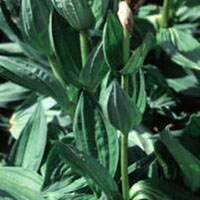Gentian
 © Steven Foster
© Steven FosterParts Used & Where Grown
Gentian originally comes from meadows in Europe and Turkey. However, it is now also cultivated in North America. The root is used in herbal medicine.
- Reliable and relatively consistent scientific data showing a substantial health benefit.
- Contradictory, insufficient, or preliminary studies suggesting a health benefit or minimal health benefit.
- For an herb, supported by traditional use but minimal or no scientific evidence. For a supplement, little scientific support.
Our proprietary “Star-Rating” system was developed to help you easily understand the amount of scientific support behind each supplement in relation to a specific health condition. While there is no way to predict whether a vitamin, mineral, or herb will successfully treat or prevent associated health conditions, our unique ratings tell you how well these supplements are understood by the medical community, and whether studies have found them to be effective for other people.
For over a decade, our team has combed through thousands of research articles published in reputable journals. To help you make educated decisions, and to better understand controversial or confusing supplements, our medical experts have digested the science into these three easy-to-follow ratings. We hope this provides you with a helpful resource to make informed decisions towards your health and well-being.
This supplement has been used in connection with the following health conditions:
| Used for | Amount | Why |
|---|---|---|
Indigestion, Heartburn, and Low Stomach Acidity | Refer to label instructions | Gentian is a bitter herb thought to stimulate digestion by increasing saliva production and promoting stomach acid and digestive enzyme production. |
Poor Digestion | Refer to label instructions | Gentian root and other highly bitter plants have been used for centuries by herbalists in Europe as digestive aids, and it is still used to treat poor appetite and indigestion. (Caution: Gentian should not be used by people suffering from excessive stomach acid, heartburn, peptic ulcer disease, or gastritis.) |
Sinusitis (Elder Flower, Primrose Flowers, Sorrel, Vervain) | Refer to label instructions | An herbal combination of gentian root, primrose flowers, sorrel herb, elder flowers, and European vervain has been found to help promote mucus drainage from the sinuses. |
Traditional Use (May Not Be Supported by Scientific Studies)
Gentian root and other highly bitter plants have been used for centuries by herbalists in Europe as digestive aids (the well-known Swedish bitters often contain gentian). Other folk uses included topical application on skin tumors, decreasing fevers, and treatment of diarrhea.1
Active constituents: Gentian contains bitter substances such as the glycosides gentiopicrin and amarogentin. The bitter taste of these can be detected even when diluted 50,000 times.2 Besides stimulating secretion of saliva in the mouth and hydrochloric acid in the stomach, gentiopicrin may protect the liver.3 Gentian is used to treat poor appetite and indigestion.4 An open study shows that gentian tincture inhibits the feeling of fullness after eating, suggesting it could improve poor appetite.5
Copyright © 2024 TraceGains, Inc. All rights reserved.
Learn more about TraceGains, the company.
The information presented by TraceGains is for informational purposes only. It is based on scientific studies (human, animal, or in vitro), clinical experience, or traditional usage as cited in each article. The results reported may not necessarily occur in all individuals. Self-treatment is not recommended for life-threatening conditions that require medical treatment under a doctor's care. For many of the conditions discussed, treatment with prescription or over the counter medication is also available. Consult your doctor, practitioner, and/or pharmacist for any health problem and before using any supplements or before making any changes in prescribed medications. Information expires December 2024.
